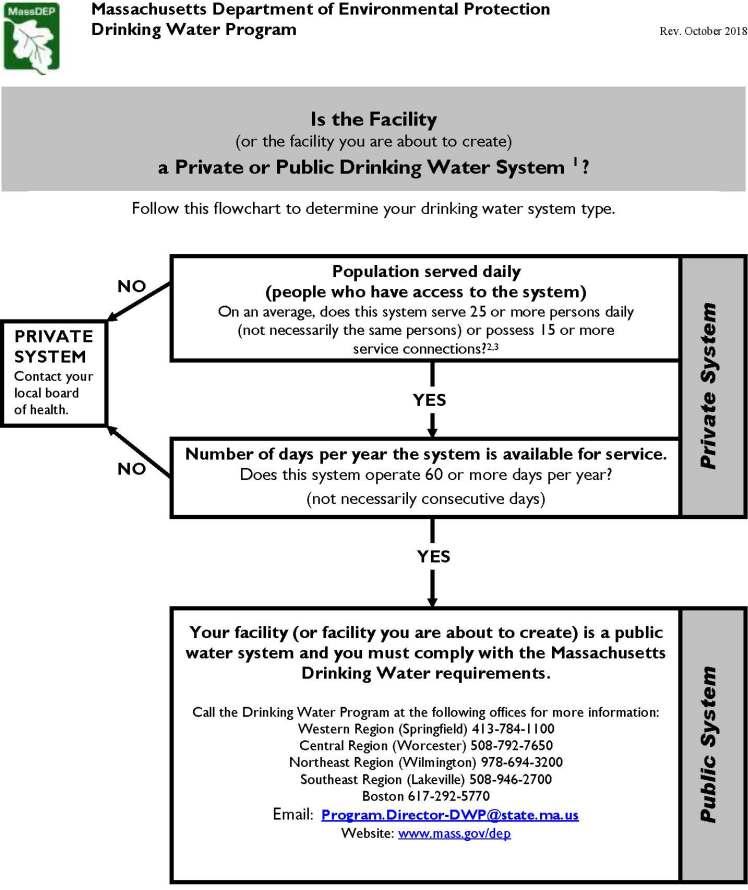In Massachusetts, public and private water systems are regulated differently. MassDEP regulates public water systems under the Massachusetts Drinking Water Regulations, 310 CMR 22.00. Local boards of health regulate private water systems (private wells).
A downloadable version of this content is available at the bottom of this page.
Flowchart: Is my Facility Public or Private?
1. As defined by the Massachusetts Drinking Water Regulations, 310 CMR 22.00, and the Federal Safe Drinking Water Act.
2. To determine a residential population you may take the number of bedrooms and multiply by two, or take service connections and multiply by 1.67. Use the greater number. For more details see Drinking Water Policy 88-11: Public Water System Determination.
3. For more information about food establishments see Drinking Water Policy 94-02: Determination of Public or Private Water System Type for Establishments Serving Food.
Additional Resources
Excerpt from the Massachusetts Drinking Water Regulations
310 CMR 22.02, Definitions of Public Water Systems:
Public Water System means a system for the provision to the public of water for human consumption, through pipes or other constructed conveyances, if such system has at least 15 service connections or regularly serves an average of at least 25 individuals daily at least 60 days of the year. Such term includes any collection, treatment, storage, and distribution facilities under control of the operator of such a system and used primarily in connection with such system, and any collection or pretreatment storage facilities not under such control, which are used primarily in connection with such system.
The Department may presume that a system is a public water system as defined herein based on the average number of persons using a facility served by the system or on the number of bedrooms in a residential home or facility. The Department reserves the right to evaluate and determine whether two or more wells located on commonly owned property, that individually may serve less than 25 people, but collectively serve more than 25 people for more than 60 days of the year should not be regulated as a public water system, taking into account the risk to public health. A public water system includes a “community water system” or a “non-community water system”.
- Community Water System means a public water system that serves at least 15 service connections used by year-round residents or regularly serves at least 25 year-round residents.
- Non-community Water System means a public water system that is not a community water system.
- Non-transient Non-community Water System or “NTNC” means a public water system that is not a community water system and that has at least 15 service connections or regularly serves at least 25 of the same persons or more approximately four or more hours per day, four or more days per week, more than six months or 180 days per year, such as a workplace providing water to its employees.
- Transient Non-community Water System or “TNC” means a public water system that is not a community water system or a non-transient non-community water system, but is a public water system that has at least 15 service connections or serves water to 25 different persons at least 60 days of the year. Some examples of these types of systems are: restaurants, motels, camp grounds, parks, golf courses, ski areas, and community centers.
Additional Resources
-
Open PDF file, 40.87 KB, Private or Public Drinking Water System (English, PDF 40.87 KB)
